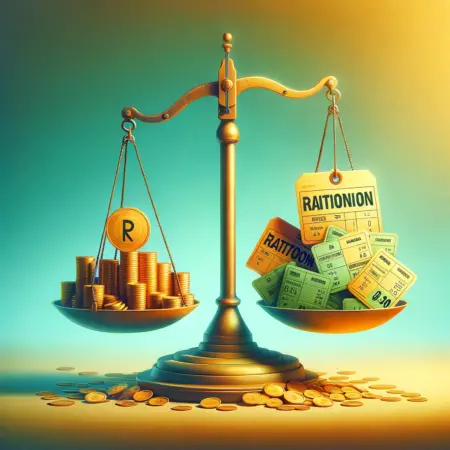What is Rationing,this is very broad topic for every economist,student and businessman. Rationing of foodstuffs and other necessary articles becomes thus absolutely necessary in modern war-time economy. ‘Ration’ is of course a military term, meaning ‘the limited supply of food given to a soldier’. But in a modern war-time structure of society where every man and woman has to take some part in the prosecution of the war, the commodities of life have to be both limited and controlled in accordance with the principles of equity and justice. Indeed, the system of rationing in respect of some articles such as wheat, rice, cloth and kerosene oil embraced even the seven lakhs of villages that there were in the subcontinent.

Rationing Is Regimentation of Civilian Life
Rationing is regimentation of civilian life. It has its good as well as bad points. One of the obviously good points of the system of rationing is of course that the Government has a perfect control over the total quantity of the important articles of trade and, therefore, can ensure an equitable distribution of them amongst the people according to their minimum needs. In the absence of effective rationing, hoarders and war profiteers might stock in secret hide-outs large quantities of wheat,rice or any other important commodity and sell them at enormously high prices to the starving millions.
There is another aspect of rationing which few people quite realise. Under the system of scientific rationing, people almost unconsciously learn lessons in socialism; for rationing is a great level of distinctions. A poor man, for instance, with ten members in his family can have a larger quantity of sugar than a rich man with only a wife and child to support. Again, a person, however rich, cannot wealth on the occasion of marriage or any other festive day princely banquets and feasts. As Emerson says, “there is no ’s self-sufficiency”; man can, indeed, deny himself many conveniences of life and can reduce his wants to a minimum. Never is this lesson realized more deeply than under the system of rationing in wartime economy.
What Everyone Ought To Know About What Is Rationing
The Ultimate Benefits of Rationing
The rich, the well-to-do, and even the upper middle classes of society always chafe at rationing, for they cannot afford the ordinary amenities of life such as they could with ease in peacetime. With ration-cards for cloth, sugar or wheat or rice, they have to queue up before the Government depots and wait for ages before they are attended to. The mad rush of the crowd and the frenzied jostle of the customers are a sight for the gods, mocking at the vanity of man.
How Rationing And Price Control Go Hand In Hand
Rationing and price control go hand in hand; the one cannot exist without the other. The Government from time to time issues lists of commodities, both major and minor—the foodstuffs, medical goods and even toilet goods—and circulates them among the dealers. It is a sad experience that as soon as a commodity’s price is controlled by the Government, it disappears from the market with dramatic swiftness and bobs up in the black market. Here as elsewhere—the black market is the under world of trade in which opportunists and black-mailers, profiteers, and unscrupulous capitalists thrive at the expense of the poor and the needy.
In this subcontinent during and after the Second Great World War, rationing and price-control had been subjected to very harsh criticism. Complaints had been heard that the system of rationing was undemocratic in character; people who commanded local influence and enjoyed a higher status easily resorted to tricks and devices whereby they got more than their legitimate quota of goods that were severely rationed. Officials who were in charge of rationing in the different cities had been sometimes charged with corruption or extending patronage to the select few and practising nepotism.
Similarly, as Dr. Gregory, Economic Adviser to the Government of India, rightly observed price-control, was an extremely difficult problem. The reasons arc obvious. First, economy here is backward and is not properly organised; secondly, it is a vast country and it is difficult to transport vast amounts of food grains from surplus province like the Former Punjab to a deficit province like Former Bengal. The price control of wheat was a dismal failure. The main causes of this failure are not far to seek. In the first place,the control price of wheat was not determined after careful consideration of its cost of production.
The Ultimate Guide To what is Rationing For Economist
In the second place, the price of wheat was not fixed in relation to those of other food grains; in Bombay, for instance, dealers in. wheat converted wheat into flour and sold it at very high prices. In the third place, some provincial Governments sold their surplus wheat to the sister deficit provinces at high rates and made enormous profits. In the fourth place, large quantities of wheat and cloth were exported to foreign countries, notably, Persia and China. All these factors had no doubt complicated the problem of price-control in this subcontinent.
Conclusion
We conclude them that in war economy, both rationing and price control are an imperative necessity. But, rationing should be free from corruption and price-control based on justice and equity. If war economy were scientifically planned !, Bengal would not have been devastated by famine and pestilence. The Bengal Famine of 1943 was in the opinion of many competent observers a man-made famine, not the scourge of nature nor one of the ten plagues with which Jehovah of the Jews had punished the Egyptians of old At no hour in the history is their greater need for strict rationing of essential goods and control of prices, for check on war profiteers and black marketers.
The problems of rationing and price control are connected with the problem of world food-shortage at most points. U.S.A., Africa. Argentina and Canada are the only surplus areas of wheat. Expresident Hoover declared at Washington, at the conclusion of his tour, that of the twenty-two countries including Pakistan and India which he had visited were brought to the brink of starvation. A better and more chastened conscience is needed among the world’s economists and politicians and that better rationing and juster price- control may regulate the lives of—weary people.
Rationing in economics is a system for controlling the distribution of resources, products, or services when there is limited supply and high demand. It is often used to ensure fair distribution and prevent price surges. Here’s a tabular guide to understand how rationing controls price:
| Aspect | Description of Rationing’s Role | Impact on Price Control |
|---|---|---|
| Supply Limitation | Rationing limits the quantity of a good each individual can obtain. | Prevents overconsumption and hoarding, stabilizing prices. |
| Demand Management | It helps in managing excessive demand for a limited resource. | Reduces the likelihood of price spikes due to high demand. |
| Fair Distribution | Ensures equitable access to resources among all sections of society. | Prevents wealth-based access, curbing market-based price inflation. |
| Price Ceiling | Often accompanies rationing to set a maximum price for the rationed goods. | Directly controls the market price, preventing it from exceeding a set limit. |
| Market Stabilization | Provides a controlled environment for the market during shortages. | Aids in maintaining overall economic stability, indirectly influencing prices. |
| Preventing Black Markets | Rationing can deter the formation of black markets for scarce items. | Helps in keeping prices at official levels, reducing illegal markups. |
| Emergency Management | In times of crisis, rationing can be an effective tool for resource allocation. | Ensures essential goods are affordable during emergencies. |
Rationing can be a critical tool in economic policy, especially during times of war, natural disasters, or other crises. By controlling the distribution and access to scarce resources, it helps to stabilize prices and prevent market distortions. However, it’s important to note that rationing can also have drawbacks, such as creating inefficiencies and potential black markets if not managed properly.
